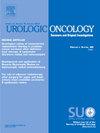Is primary retroperitoneal lymph node dissection the way forward for patients with testicular seminoma and limited retroperitoneal metastases?
IF 2.4
3区 医学
Q3 ONCOLOGY
Urologic Oncology-seminars and Original Investigations
Pub Date : 2025-05-01
DOI:10.1016/j.urolonc.2025.01.016
引用次数: 0
Abstract
Testicular cancer represents 1% of adult neoplasms and is the most common solid malignancy in young men. Of men presenting with seminoma, approximately 20% will have clinical stage (CS) II disease, characterized by enlarged retroperitoneal lymph nodes without further metastasis. A further group of men will present with CS I disease but later experience relapse in the retroperitoneal lymph nodes. The standard treatment for many decades in these patients is either radiotherapy (30–36Gy) or chemotherapy (BEPx3, EPx4). Despite high cure rates with these modalities, concerns persist regarding short and long-term treatment-related toxicities. Survivors of testicular cancer treated with chemotherapy or radiotherapy face increased risks of cardiovascular disease (1.5–6-fold) and secondary malignancies (twice as likely for solid cancers and 5 times for leukemia). An alternative approach explored is primary Retroperitoneal Lymph Node Dissection (RPLND). Several institutional series along with 4 single-arm phase II trials have investigated primary RPLND in men with low-volume retroperitoneal metastases. Herein, we review the evidence, strengths and limitations of the current studies and future for primary RPLND for seminoma.
原发性腹膜后淋巴结清扫是睾丸精原细胞瘤和有限腹膜后转移患者的治疗方法吗?
睾丸癌占成人肿瘤的 1%,是年轻男性最常见的实体恶性肿瘤。在罹患精原细胞瘤的男性中,约20%的患者会出现临床分期(CS)II,其特点是腹膜后淋巴结肿大,但不会进一步转移。还有一部分男性会出现 CS I 期疾病,但随后腹膜后淋巴结复发。几十年来,这些患者的标准治疗方法是放疗(30-36Gy)或化疗(BEPx3、EPx4)。尽管这些治疗方法的治愈率很高,但人们对短期和长期治疗相关毒性的担忧依然存在。接受化疗或放疗的睾丸癌幸存者罹患心血管疾病(1.5-6 倍)和继发性恶性肿瘤(实体瘤的几率是前者的两倍,白血病的几率是前者的 5 倍)的风险增加。腹膜后淋巴结清扫术(RPLND)是一种可供选择的方法。一些机构的系列研究和 4 项单臂 II 期试验对腹膜后低体积转移的男性患者进行了原发性 RPLND 研究。在此,我们回顾了当前研究的证据、优势和局限性,以及精原细胞瘤初治 RPLND 的未来。
本文章由计算机程序翻译,如有差异,请以英文原文为准。
求助全文
约1分钟内获得全文
求助全文
来源期刊
CiteScore
4.80
自引率
3.70%
发文量
297
审稿时长
7.6 weeks
期刊介绍:
Urologic Oncology: Seminars and Original Investigations is the official journal of the Society of Urologic Oncology. The journal publishes practical, timely, and relevant clinical and basic science research articles which address any aspect of urologic oncology. Each issue comprises original research, news and topics, survey articles providing short commentaries on other important articles in the urologic oncology literature, and reviews including an in-depth Seminar examining a specific clinical dilemma. The journal periodically publishes supplement issues devoted to areas of current interest to the urologic oncology community. Articles published are of interest to researchers and the clinicians involved in the practice of urologic oncology including urologists, oncologists, and radiologists.

 求助内容:
求助内容: 应助结果提醒方式:
应助结果提醒方式:


